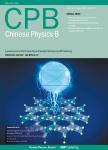Performance enhancement of a viscoelastic bistable energy harvester using time-delayed feedback control
作者机构:School of Mathematics and StatisticsGuangdong University of TechnologyGuangzhou 510520China State Key Laboratory for Strength and Vibration of Mechanical StructuresXi'an Jiaotong UniversityXi'an 710049China Exeter Small-Scale Robotics LaboratoryEngineering DepartmentUniversity of ExeterNorth Park RoadExeter EX44QFUK
出 版 物:《Chinese Physics B》 (中国物理B(英文版))
年 卷 期:2024年第33卷第6期
页 面:142-154页
核心收录:
学科分类:08[工学] 0807[工学-动力工程及工程热物理] 0702[理学-物理学]
基 金:Project supported by the National Natural Science Foundation of China (Grant No. 11902081) the Science and Technology Projects of Guangzhou (Grant No. 202201010326) the Guangdong Provincial Basic and Applied Basic Research Foundation (Grant No. 2023A1515010833)
主 题:energy harvesting bistability stochastic averaging method stochastic resonance time-delayed feedback control
摘 要:This paper focuses on the stochastic analysis of a viscoelastic bistable energy harvesting system under colored noise and harmonic excitation, and adopts the time-delayed feedback control to improve its harvesting efficiency. Firstly, to obtain the dimensionless governing equation of the system, the original bistable system is approximated as a system without viscoelastic term by using the stochastic averaging method of energy envelope, and then is further decoupled to derive an equivalent system. The credibility of the proposed method is validated by contrasting the consistency between the numerical and the analytical results of the equivalent system under different noise conditions. The influence of system parameters on average output power is analyzed, and the control effect of the time-delayed feedback control on system performance is compared. The output performance of the system is improved with the occurrence of stochastic resonance(SR). Therefore, the signal-to-noise ratio expression for measuring SR is derived, and the dependence of its SR behavior on different parameters is explored.



